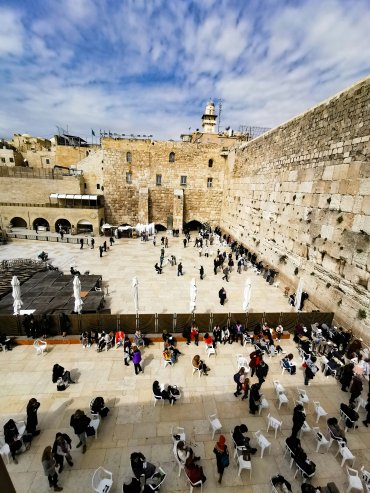How I Learned The Art Of Prayer
Since I was a little kid, I’ve been trained in the art of prayer.
I learned from a really young age that praying is what we do in any occasion. When the heart is full of gratitude, there is prayer. When the soul is full of pain, there is prayer. When it seems pointless to talk things out with other people, there is prayer. When seeking clarity on one’s own feelings, there is prayer. And when there don’t seem to be any words… there is prayer.
Jewish prayer gives wings to our emotions and words to our yearnings. It has the power to uplift, to articulate, to clarify. The Jewish prayer book is a window into many core concepts in our faith that warm the heart, challenge the mind, and excite the soul. Formal prayer is important, and for women, who emote more instinctively and connect more readily with others, praying informally, personally, and often, can be a deeply rewarding exercise in spirituality and in our relationship with G-d.
Each time I pray – whether formally, from the Hebrew prayer book, or spontaneously in my own words – I feel a cleansing of the soul and a calming of the mind (presuming I’m paying attention to what I’m saying). I envision G-d listening serenely, without judgment, while I step away from life’s chaos for a few moments and sort through the jumble of thoughts in my brain. I thank Him for my blessings, praise Him for His greatness, and ask Him for my wish list. I pour out my pain to Him and gratefully appreciate the successes and gifts He has given me. Through this process, I come to realize how much I have to be grateful for and that He is the source of everything; that the good things in life are a gift of love, and the struggles are a learning opportunity to make me a better person. It reminds me that everything happens for a reason; that nothing is random; that the people and situations in life each have a message that I need to hear.
I walk back into real life enriched and empowered by the experience.
It took me awhile to figure out that prayer is nothing more, and nothing less, than emoting to G-d. It’s called “avodah she-balev” – service (really, work) of the heart – and it really is work. Today, cleansing one’s mind and clearing it of clutter has become a well-known goal, thanks to yoga and other meditative practices. And that’s really where the work is. Talking to G-d isn’t that hard, once you’re in the zone. It’s getting in the zone: that’s where the work is. Once you can clear a space in your day, a space in your mind, a space in your heart, talking to G-d is easy. Once you start, you almost can’t stop. There is so much to say. So much to ask for. So much to thank for. So much emotion to spill.
You can read more of Ruchi’s thoughts on prayer in her book, Conversations With G-d – Prayers for Jewish Women . Available on Amazon.
If you found this content meaningful and want to help further our mission through our Keter, Makom, and Tikun branches, please consider becoming a Change Maker today.






